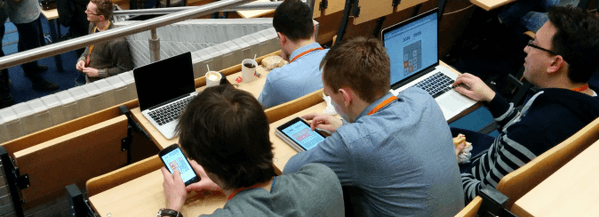wroc_love.rb flashback
Why do we go to Ruby conferences? Depending on who you ask, the answer will be different. Among all of them we can distinguish the three most frequently repeated answers: to learn, to share knowledge and to meet people. Certainly, conferences are the best opportunity in which to do all of that. wroc_love.rb was one of them and we took it. There aren’t many Ruby related events happening in Poland, that’s why it was even more tempting for us. On a warm Friday morning, 15 of the Lunar Logic clan departed to Wrocław.
All technical talks were scheduled for the following two days so Friday afternoon was all about project management techniques, programmers soft skills and failed ventures.
During the three days of the conference we had the chance to see 14 presentations. There is no way to tell you about them all in one short blog post. That’s why I’ve chosen the 3 most interesting.
Why should we care about design? What are software boundaries? Which patterns are needed to create a maintainable project? Adam Hawkins answered these questions. Of course fourteen minutes was not enough. That’s why Adam created a series of articles about rediscovering software design.
Another speaker worth mentioning is Markus Schirp who is, with Piotr Solnica, one of the core team members of Ruby Object Mapper. He talked about mutants and how to kill them. Mutant, a gem created by Markus, is a tool for mutation testing.
Of course we have to mention Piotr Szotkowski’s talk about Bogus, a library created by former Lunar employees Adam Pohorecki and Paweł Pierzchała. Bogus is a tool which helps developers write reliable tests ensuring that they don’t stub or mock methods that don’t actually exist in the mocked objects. If you haven’t tried it yet, do it!
Besides other talks, the wroc_love conference continued with Q&A blocks during which experienced developers could share opinions about code metrics and legacy rails apps.
Almost all the talks had something in common. All of them reminds us that Rails is not perfect. Every programmer who, at least, has created a medium-sized Rails app know this. Rails, as a framework, gives us great tools that we can use for fast app building, but when our app popularity reaches a certain level we realise that something is wrong; some things work too slow, there are problems with maintaining app code, and adding new features is a pain. That’s why we, as developers, constantly come up with ways to work around Rails and cope with all these problems.
For some time now we’ve been hearing discussions about the future of Rails. There are so many good ideas but we cannot yet predict if any of it will be part of the next Rails release. Andrzej Krzywda, one of wroc_love.rb conf organizers, created an open document which contains a few ideas worth reading about.
To be honest I can’t say anything bad about the organizational side of conference. Talks were very well prepared, speakers always answered questions from the public and there was hot coffee for all participants. People had a lot of time for networking during breaks or evening parties.
Conferences are great. They make us aware of many problems and at the same time they provide solutions. For me it was also a great motivator. After spending a few days with many people with similar interests, I felt and still feel ready to take on the challenge of improving my skills.
PS. wroc_love.rb was also called the 2048 conference ;)

